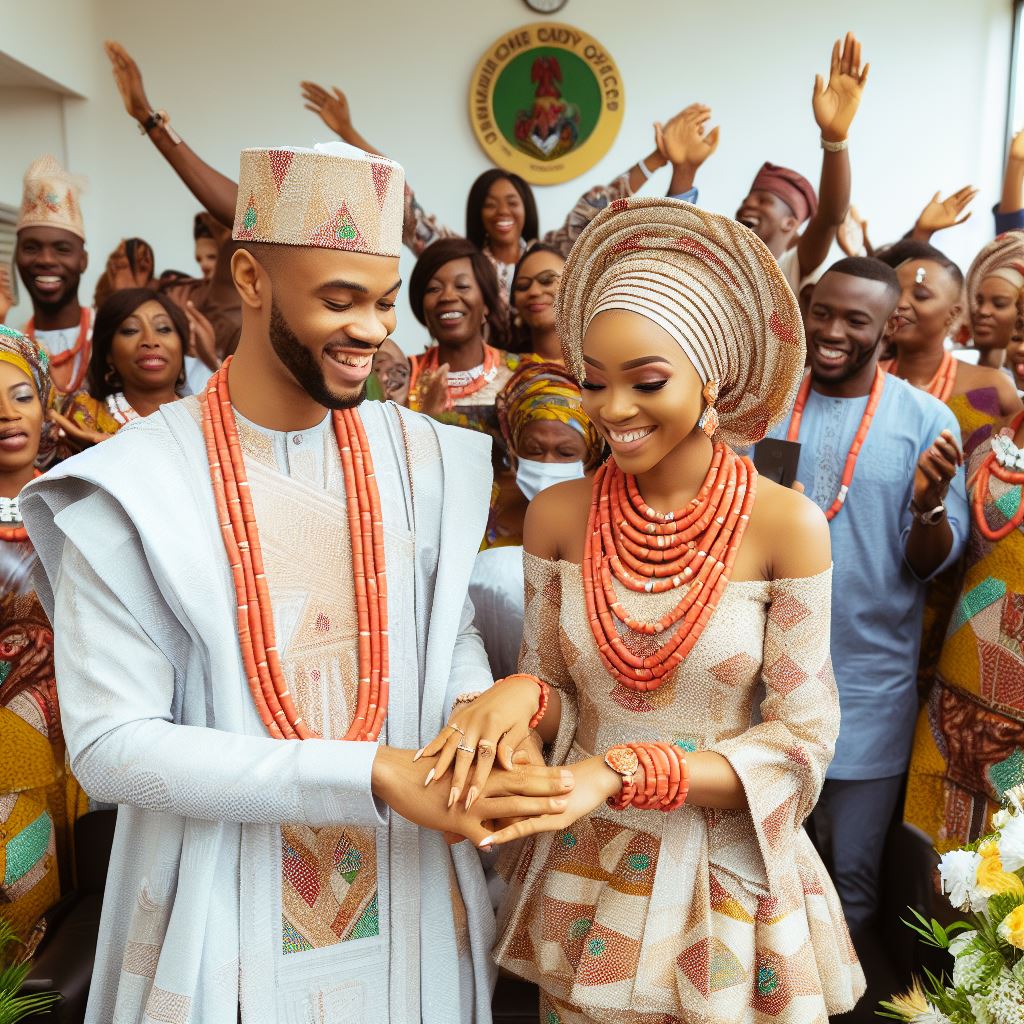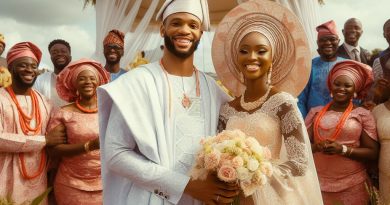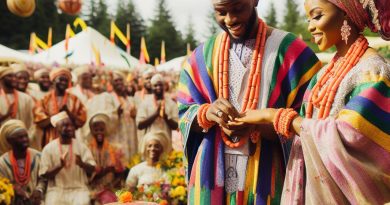Marriage by Ordinance vs. Traditional Marriage: What’s Different?
Last Updated on October 17, 2023
Introduction
Marriage in Nigeria, whether by Ordinance or through Traditional Ceremonies, stands as a cornerstone of societal structure, rooted in rich cultural traditions that transcend time.
This union comes in two distinct forms: marriage by ordinance and traditional marriage.
In this blog post, we will delve into these two distinct types, revealing their nuances and distinctions, while providing you with a comprehensive understanding of the intricacies that define matrimonial unions in this diverse and dynamic nation.
Marriage by ordinance, often referred to as civil or statutory marriage, is a legally recognized union typically conducted in government or religious institutions.
In contrast, traditional marriage, as the name suggests, is deeply rooted in indigenous customs, varying across Nigeria’s numerous ethnic groups.
The purpose of this blog post is to shed light on the disparities between these two marriage forms, touching on their legal implications, cultural significance, and overall differences in ceremonies, rituals, and expectations.
As you continue reading, you’ll gain insights into how these two types of marriages function, the societal implications, and the vital distinctions that influence the lives of countless Nigerian couples.
Definition and overview of marriage by ordinance
In this section, we will explore the topic of marriage by ordinance and compare it to traditional marriage.
We will define what marriage by ordinance means, how it is recognized by the law in Nigeria, and discuss the process and requirements for getting married through this method.
Additionally, we will highlight the legal and societal benefits of marriage by ordinance.
What marriage by ordinance means
- Marriage by ordinance refers to the union of two individuals that is legally recognized by the government.
- The Nigerian law recognizes marriage by ordinance as one of the acceptable forms of marriage.
How Marriage by Ordinance is Recognized by Law in Nigeria
- The Marriage Act of Nigeria governs the legal aspects of marriage, including marriage by ordinance.
- Marriage by ordinance follows the provisions of the Marriage Act, making it valid and legally binding.
- It is recognized as an official and legitimate form of marriage in Nigerian courts.
The Process and Requirements for Getting Married by Ordinance
- Couples wishing to marry by ordinance must first obtain a marriage license from the appropriate government office.
- The license application typically requires proof of identity, age, and marital status.
- The couple must also provide two witnesses who are not blood relatives.
- After the license is obtained, the marriage ceremony can take place in a church, mosque, or registry office.
- The ceremony is officiated by a recognized religious leader or a marriage registrar.
- The couple must exchange vows and sign the marriage register in the presence of the officiating party and witnesses.
Legal and Societal Benefits of Marriage by Ordinance
- Marriage by ordinance grants legal recognition and protection to the union.
- Couples enjoy legal rights and privileges, such as inheritance rights, tax benefits, and access to healthcare.
- It provides a framework for the dissolution of the marriage through legal divorce processes.
- Marriage by ordinance contributes to social stability and the formation of family units within society.
- It offers a sense of security and commitment to the couple, their families, and the wider community.
- The legal framework enables the resolution of disputes and issues that may arise during the marriage.
Basically, marriage by ordinance provides a formal and recognized structure for couples to enter into a legally binding union.
It offers numerous legal and societal benefits, ensuring the protection and well-being of the individuals involved.
By understanding the process and requirements, couples can make informed decisions and choose the best approach to formalize their commitment.
Read: Understanding ‘Marriage by Ordinance’ in Nigeria: A Primer
Definition and Overview of Traditional Marriage
Traditional marriage in Nigeria is a union between a man and a woman recognized by their families and communities.
It is a sacred institution that encompasses various cultural and traditional practices.
What traditional marriage entails in Nigeria
In Nigeria, traditional marriage involves the coming together of two individuals in a ceremony that symbolizes the union of their families and the creation of a new family unit.
It is a celebration of love, commitment, and heritage.
The cultural and traditional practices associated with traditional marriages
Traditional marriages in Nigeria are characterized by elaborate rituals and customs that vary across different ethnic groups.
These practices often include the payment of dowry, exchange of gifts, traditional ceremonies, and the involvement of family elders.
Significance of traditional marriages in Nigerian society
Traditional marriages hold immense importance in Nigerian society as they contribute to the preservation of cultural identity, strengthening of family bonds, and promotion of social cohesion.
They also serve as a platform for showcasing cultural heritage and traditions.
The role of families and communities in traditional marriages
In Nigeria, families and communities play a central role in traditional marriages.
They are actively involved in the matchmaking process, negotiation of dowry, and the overall organization of the wedding ceremony.
Their support and blessings are essential for a successful marriage.
Moreover, families and communities provide guidance and support to the newly married couple throughout their married life.
They serve as a network of support, helping to resolve conflicts and providing a sense of belonging and security.
Additionally, traditional marriages help to foster communal ties as they bring together extended family members, friends, and well-wishers.
These gatherings not only celebrate the union of the couple but also serve as a platform for social interaction and community building.
In conclusion, traditional marriages in Nigeria are deeply rooted in cultural and traditional practices.
They hold significant value in Nigerian society and play a crucial role in preserving cultural heritage, strengthening family ties, and fostering community cohesion.
The involvement of families and communities further reinforces the importance of these unions and ensures that they are celebrated and cherished.
Read: Balancing Tradition and Modern Views on Marriage in Nigeria
Differences in Ceremony and Rituals
When it comes to the wedding ceremonies, there are distinct differences between marriage by ordinance and traditional marriage. Let’s delve into the unique characteristics of each form of marriage.
Marriage by Ordinance
In a marriage by ordinance, the wedding ceremony is typically conducted in a civil setting, such as a courthouse, city hall, or another government office.
This type of marriage ceremony is often simple and straightforward, focusing primarily on the legal aspects of the union.
One significant difference is that there is no religious or cultural affiliation associated with a marriage by ordinance.
The absence of any specific religious rituals allows couples to cater to their own personal preferences and beliefs without any external influences.
Most marriage by ordinance ceremonies involve the presence of a marriage officer or a civil servant who officiates the marriage.
The ceremony usually begins with an introduction by the officer, followed by statements of intent and the exchange of vows between the couple.
After the vows, the couple signs the marriage certificate, and witnesses may also be required to sign as well.
The ceremony concludes with pronouncements of their union, and the marriage officer presents the newly married couple with their legal marriage certificate.
Traditional Marriage
In stark contrast to marriage by ordinance, traditional marriage ceremonies are steeped in rich cultural and religious customs.
These ceremonies vary significantly based on the specific cultural or religious background of the couple.
For instance, in a Christian wedding ceremony, the couple often exchange vows in a church, surrounded by their family and friends.
The ceremony is presided over by a religious figure, such as a priest or minister, who conducts the rituals according to their religious traditions.
Similarly, in Indian weddings, there are elaborate rituals that can span several days.
The ceremony takes place in the presence of a Hindu priest, and the couple performs customs like exchanging garlands, walking around a sacred fire seven times, and taking their seven wedding vows.
Traditional marriage ceremonies often involve intricate rituals and traditions passed down through generations.
These can include blessings from elders, symbolic gestures like the lighting of a unity candle or the tying of the knot, and the exchange of rings as a symbol of commitment.
Cultural and Religious Practices
Marriage by ordinance, being devoid of any cultural or religious affiliation, does not incorporate any specific practices unique to a particular culture or religion.
This allows couples to have complete freedom to personalize their ceremony according to their preferences.
On the other hand, traditional marriage ceremonies are deeply rooted in cultural or religious practices.
These ceremonies may include traditional attire and attire specific to the cultural background of the couple, such as traditional wedding gowns or traditional garments like a sari or a kimono.
Furthermore, various religious practices are unique to each cultural or religious group.
For example, Jewish weddings may feature the breaking of a glass, symbolizing the destruction of the holy temple in Jerusalem.
In contrast, Muslim weddings may have a ritual called the nikah, where the couple agrees to the terms of the marriage contract.
Generally, the differences in wedding ceremonies between marriage by ordinance and traditional marriage are significant.
While the former is typically simple and devoid of cultural or religious rituals, the latter is a vibrant celebration of customs and traditions specific to the couple’s cultural or religious background.
Read: Online vs. In-Person: Which Counseling Approach Suits You?

Legal Implications and Rights
When it comes to marriage, there are two main types to consider: marriage by ordinance and traditional marriage.
Each type has its own legal implications, rights, and obligations.
In this section, we will delve into the legal aspects of both types of marriages, comparing their legal recognition, protection, and the potential differences they may present in terms of inheritance, divorce, and property rights.
Legal rights and obligations of couples in marriage by ordinance
Marriage by ordinance refers to a marriage that is legally recognized by the government and follows certain procedures and requirements set by the law.
Couples who opt for this type of marriage enjoy specific legal rights and obligations.
One of the key advantages is the legal recognition of their union, which provides them with various benefits and protections.
Legal recognition and protection of marriage by ordinance in Nigeria
In Nigeria, the legal recognition and protection of marriage by ordinance are governed by the Marriage Act.
This act establishes the legal framework for this type of marriage, outlining the requirements for its validity, such as age, consent, and capacity.
It also sets forth the legal rights and obligations of married couples, including rights to property, inheritance, and support.
Contrastingly, traditional marriages are often not legally recognized or protected to the same extent as marriages by ordinance.
Traditional marriages are based on cultural and customary practices rather than statutory laws.
While they hold great social significance, they may lack the legal recognition and protection that marriages by ordinance provide.
Potential differences in inheritance, divorce, and property rights
Differences in inheritance
This disparity in legal status and protection can have significant implications, especially in areas like inheritance, divorce, and property rights.
Inheritance laws often favor marriages by ordinance, ensuring that spouses are entitled to inherit their partner’s property and assets.
Traditional marriages may not enjoy the same level of protection, leaving spouses vulnerable in cases of inheritance disputes.
Difference in Divorce proceedings
Divorce proceedings also differ between the two types of marriages.
Marriages by ordinance follow specific legal procedures for divorce, including the division of assets and settlement of custody and support.
Traditional marriages, on the other hand, may rely on customary or traditional practices, which can make the process more complex and less predictable in terms of legal rights and obligations.
Difference in Property Rights
Furthermore, property rights can also vary between marriage by ordinance and traditional marriage.
In marriages by ordinance, property acquired during the marriage is usually considered jointly owned by both spouses unless otherwise stated.
Traditional marriages may not provide the same level of clarity and protection regarding property rights, potentially leading to conflicts and disputes.
It is essential for couples to understand the legal implications and rights associated with their chosen type of marriage.
While marriage by ordinance offers a secure legal framework and protection, traditional marriage may not afford the same level of security.
Therefore, couples contemplating marriage should carefully consider the potential differences in inheritance, divorce, and property rights between the two types before making a decision.
Essentially, marriage by ordinance and traditional marriage differ in terms of their legal implications, rights, and obligations.
Marriages by ordinance enjoy legal recognition, protection, and clear guidelines for inheritance, divorce, and property rights.
Traditional marriages, although culturally significant, may not offer the same level of legal safeguards.
It is essential for couples to be aware of these differences and make an informed decision that aligns with their needs and desires.
Read: The Role of Witnesses in Nigerian Marriage Registration
Social and Cultural Aspects
In this section, we will delve into the social and cultural aspects surrounding the acceptance and preference for marriage by ordinance and traditional marriage.
We will explore the societal perception of these types of marriages, the influence of Westernization and modernization on people’s preference, the significance of tradition and cultural heritage in traditional marriages, and any changing trends or preferences in recent times.
1. Societal Acceptance and Perception
- Marriage by ordinance and traditional marriage are viewed differently by societies globally.
- Public opinion plays a crucial role in shaping the acceptance or rejection of these types of marriages.
- Factors such as religion, cultural norms, and individual values influence societal perception.
- Diverse views exist, ranging from complete acceptance to outright opposition.
- Attitudes continue to evolve as societies become more inclusive and progressive.
2. Influence of Westernization and Modernization
- The rise of Western influence has impacted traditional marriage systems across different cultures.
- Globalization and Western media have exposed individuals to alternative marriage concepts.
- Youth, especially in urban areas, often prefer marriage by ordinance due to its modern appeal.
- Familiarity with Western practices contributes to the changing preference for non-traditional unions.
- However, the influence of Westernization varies based on cultural context and societal values.
3. Role of Tradition and Cultural Heritage
- Traditional marriages hold immense cultural significance and are deeply rooted in traditions and customs.
- Cultural heritage plays a crucial role in preserving and promoting traditional marriage practices.
- Marriage ceremonies, rituals, and family involvement reflect the importance of customs and traditions.
- Traditional marriage offers a sense of identity, community pride, and continuity of cultural heritage.
- However, the level of adherence to tradition and cultural heritage may vary within different communities.
4. Changing Trends and Preferences
- In recent times, there has been an observable shift in preferences towards marriage by ordinance.
- Factors such as individual freedom, gender equality, and women empowerment contribute to this trend.
- Changing societal dynamics and the desire for personal fulfillment fuel the preference for non-traditional marriages.
- Couples seek legal and social recognition without the burden of conforming to traditional norms.
- However, it is important to note that traditional marriages still hold significance in many communities.
In general, the societal acceptance and perception of marriage by ordinance and traditional marriage vary across cultures and regions.
Westernization and modernization have influenced the preference for marriage by ordinance, while tradition and cultural heritage continue to shape traditional marriages.
Changing trends reflect the dynamic nature of societal values and individual preferences.
Ultimately, both types of marriages have their unique merits and should be respected and understood within their respective social and cultural contexts.
Conclusion
The key differences between marriage by ordinance and traditional marriage lie in their legal recognition and cultural significance.
Marriage by ordinance is recognized by the state and follows specific legal requirements, while traditional marriage is rooted in cultural and religious customs.
Both forms of marriage hold immense importance and significance in Nigerian society as they contribute to family structures, social cohesion, and the passing down of cultural values.
It is essential for readers to appreciate the diversity and value in different types of marriages, as each form contributes to the rich tapestry of Nigerian culture.
In this era of globalization, understanding and respecting different marital practices is crucial for social harmony.
Therefore, I encourage readers to share their thoughts and experiences with these types of marriage in the comments section, fostering a constructive dialogue that promotes tolerance and appreciation for the diverse forms of marriage in Nigeria.


